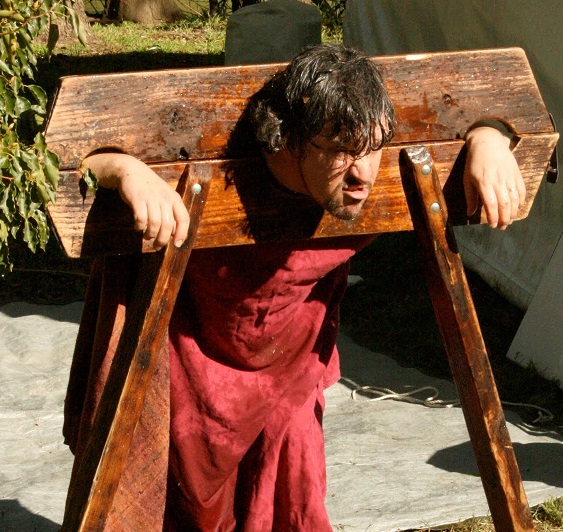More
Woes for the Prophet
Stephen
Terry
Commentary
for the October 31, 2015 Sabbath School Lesson
 “When
the priest Pashhur son of Immer, the official in charge of the temple of the
Lord, heard Jeremiah prophesying these things, he had Jeremiah the prophet
beaten and put in the stocks at the Upper Gate of Benjamin at the Lord’s
temple.” Jeremiah 20:1-2, NIV
“When
the priest Pashhur son of Immer, the official in charge of the temple of the
Lord, heard Jeremiah prophesying these things, he had Jeremiah the prophet
beaten and put in the stocks at the Upper Gate of Benjamin at the Lord’s
temple.” Jeremiah 20:1-2, NIV
Today, as then, those who speak out against current practice
often find themselves facing opposition. In some cases, those in positions of
power may be right to oppose their vocal critics who may be nothing more than
nihilistic anarchists. But in other cases, they would do well to listen to the
voices crying in the streets. Perhaps an example in that regard was attributed
to Marie Antoinette who is often said to have asked why the people were rioting
in the streets. When she was told it was because they had no bread, she was
said to have famously replied “Then let them eat cake.” In reality, this
probably did not happen and the quote is likely from a specious attribution
made by the French writer Rousseau who claimed it was spoken by une grande princesse. This could hardly
have been Antoinette who was nine years old at the time.[i]
Despite the crass indifference displayed by such a
statement, it may be typical of mistakes in judgment sometimes made by those in
power regarding those who are trying to bring attention to significant problems.
In Jeremiah’s case, the person who took umbrage was the priest in charge of the
temple, Pashhur. Zealous to protect the sanctity of the temple, he punished the
prophet, first with a beating which we do not have much detail about, then with
confinement in stocks. For those who don’t understand how cruel that is, it
often requires a person’s hands and head to be held in a wooden frame, perhaps
in a position which is neither standing nor sitting. This is usually in a
public place for the purpose of ridicule while confined. In addition to verbal
taunting, onlookers might hurl rotten food and offal at the miscreant. This was
tolerated by the authorities and considered part of the punishment. There are
no bathroom breaks. One must simply relieve themselves where they stand. This punishment
might continue thus for hours, days and sometimes even weeks. As one might
imagine the odor could be overwhelming. In Jeremiah’s case, it was at least
overnight and may have been for twenty-four hours.
One might question why the Lord would allow his servants
to suffer so, but it may be to demonstrate their sincerity. Who would want to
face such punishment if they were a false prophet, unless they were also insane?
Indeed, to those who are not submitted to the Holy Spirit’s leading, even a
true prophet may be difficult to distinguish from a crazy person. Certainly
people must have wondered this about the strange prophet Ezekiel, lying on his side
for 390 days and baking bread with cow dung to eat the while.[ii] We might ask ourselves if
we would we be among those who recognized and obeyed the prophet, or would we
be rolling our eyes and making circles next to our head to indicate insanity?
This territory on the edge of social acceptability is often where prophets
choose to walk.
Perhaps this is why those, who are dedicated to
following the Lord, often do not see their children follow the same path. It
takes a special character to part ways with one’s companions and to follow that
different drummer. This special ability cannot be inherited. Samuel, the
prophet, discovered this when he neared the end of his life and found his sons
did not follow his righteous path.[iii] Not only prophets had
this problem, priests also suffered the same. Eli, the priest saw his sons
Phineas and Hophni go astray[iv] and come to a bad end as
a result.[v] Although the priesthood was
hereditary at this time, it served as no safeguard against apostasy. This may
even be a good argument for avoiding the nepotism so common in the Christian church
today.
Those who wish to justify nepotism on the basis of that
earlier, hereditary Aaronic priesthood may find themselves suffering under the
same problematic waywardness. We may be inclined to think something magical is
passed on in the blood from one generation to the next, but in reality God
calls whom He will without regard to any of the attributes that men so often
set forth as requirements for holy orders. There are few who would follow their
parents’ footstep into the stocks or even execution, unless somehow they have
managed to glean a special call from the Lord as well. Pride and selfishness
often stand in the way. Ironically, that pride may have been fostered by the
very knowledge they hold of their forebear’s accomplishments for the Lord. They
then presume on that earlier relationship, claiming its rights with none of the
commitment.
Yet, in spite of these inherent problems, God does still
reach into those lineages to call individuals to special service. Jeremiah was
in the priestly lineage. Paul, the Apostle was a Pharisee trained under the
great teacher Gamaliel. In spite of their backgrounds they placed commitment to
their callings above any of that. Their lives were such a direct contrast to
that of their compatriots that it seems God was trying to kick start things
back into a proper spiritual path for those who had gone astray over nepotism, selfishness
and a lust for power. So many of the prophets seem to have been doing just that
as they pulled against an overwhelming tide of deeply entrenched corruption.
That they would continue the battle against such opposition gives testimony of strength
greater than is natural to men.
When we consider what Jeremiah went through, how
ridiculous some of the claims of persecution advanced by some seem today. Recently,
in Coeur d’Alene, Idaho, the owners of The Hitching Post wedding chapel came
under investigation by the local authorities for their refusal to perform
same-sex marriages. Never mind that no charges were ever filed against them. A
hue and cry that they were being persecuted for their religious faith rose far
and wide over social media. This belies any sort of a fundamental understanding
of how American democratic process works. While they have their right to
religious freedom, those who feel aggrieved also have their right to ask for an
investigation of their complaint. The government must then provide any
justified redress appropriate. None of this is persecution.
In the end, the owners of The Hitching Post were charged
with nothing as no complaint alleging discrimination was ever filed by anyone.[vi] Perhaps it is because of
texts like the one in Paul’s letter to Timothy indicating that every follower
of God will suffer persecution[vii] that such fabrications
arise. After all, what better way to prove one’s Christianity than to claim
persecution and thereby proof of one’s faithfulness to Christ? However, when
such specious claims are made, we invoke a “boy-who-cried-wolf scenario” and
diminish the future support for those who may actually be facing true
persecution for their faith. Claims like those concerning this wedding chapel
may be laughable in the face of those who are being beheaded, dispossessed and
exiled for their Christian faith. To diminish those stories may even make us
complicit in the persecution such unfortunates suffer.
Perhaps our claims of persecution for such trivials
arise because we have lost our ability to turn things over to God. Instead of
taking our concerns to Him in prayer, we make recourse to the courts and the
media, attempting to fix by ourselves problems that are more properly left to
God. Problems become more about our rights than about walking humbly before our
God.[viii]
Fighting for the rights of the poor and oppressed is
admirable, especially if we make sacrifices to do so,[ix] but when we are fighting
for our own rights there is a peculiar danger that such a struggle may morph
into a self-exaltation that is contrary to Christian humility. When that happens,
some begin to feel justified in the destruction of the property of others in
their desire to “take the struggle to the enemy.” This may be in line with the attitude
of the Christian Crusaders of the Middle Ages, who took their zeal and their
arms to Palestine and cut a bloody path to Jerusalem, but it is hardly in line
with the humility proclaimed by Jesus on the mount.[x] Those who transgress the
law of love to advance worldly power and seek selfish ends may face opposition,
but that is not persecution. The legacy of those who follow such a path is
written in blood and misery.
The legacy of Jeremiah is a commitment to saving others
through warnings of what is to come. His tears gave evidence of the love in
those warnings.[xi]
We can see people change, become born again, through personal witness and
introduction to the gentle and loving Jesus. When they willingly open the doors
of their hearts to that love, the Holy Spirit can enter in and that makes all
the difference.
